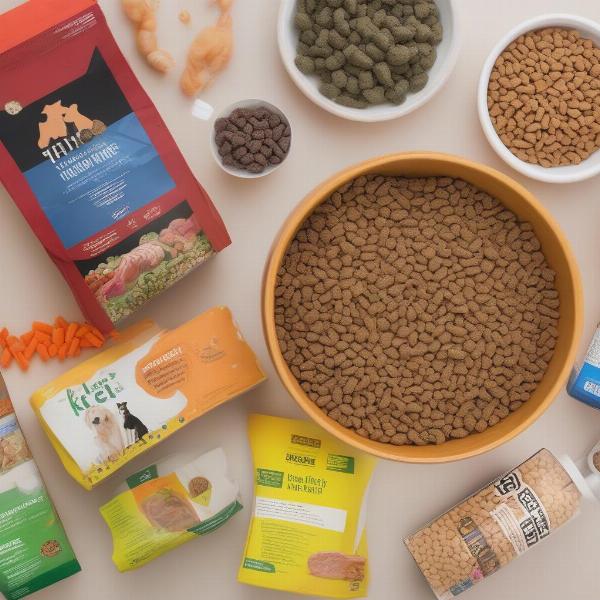Eisenberg hot dogs, a name synonymous with classic New York street food, is likely not what dog owners have in mind when searching for information about their canine companions. This query presents a fascinating intersection of human cuisine and the world of dog care. While Eisenberg’s doesn’t cater to our furry friends, this search provides an opportunity to explore what dog owners are looking for when it comes to their pets’ nutrition. Let’s dive into the world of healthy dog food and clear up any confusion surrounding this unusual search term.
Understanding the Eisenberg Hot Dogs Search
Why would someone search for “Eisenberg hot dogs” in the context of dogs? Perhaps they’re looking for information about the safety of hot dogs for canine consumption. Or maybe they’re simply curious if Eisenberg’s, known for its human fare, offers any dog-friendly options. Whatever the reason, it’s clear that the searcher is interested in food and dogs. Let’s address the elephant in the room: hot dogs, especially those designed for human consumption, are generally not recommended for dogs. They often contain high levels of sodium, fat, and other additives that can be harmful to a dog’s health.
Healthy Alternatives to Eisenberg Hot Dogs for Your Dog
So, what should you feed your dog? A balanced and nutritious diet is key to a happy and healthy canine companion. High-quality dog food, formulated specifically for a dog’s nutritional needs, is the best option. Look for brands that prioritize whole meat sources, healthy grains, and avoid artificial additives and fillers.
Choosing the Right Dog Food
Selecting the right dog food can be overwhelming. Consider your dog’s age, breed, activity level, and any specific dietary needs or allergies when making your choice. Consult with your veterinarian for personalized recommendations. They can guide you towards the best food for your individual dog’s needs.
 Choosing Healthy Dog Food
Choosing Healthy Dog Food
Beyond Commercial Dog Food: Homemade Options
For those interested in a more hands-on approach, homemade dog food can be a viable option. However, it’s crucial to ensure that the diet is nutritionally complete and balanced. Consult with a veterinary nutritionist to create a recipe that meets your dog’s specific requirements. Improperly balanced homemade diets can lead to nutritional deficiencies.
Safe Treats for Your Canine Companion
While Eisenberg hot dogs are off the menu, there are plenty of safe and healthy treats you can offer your dog. Look for treats made with natural ingredients, and avoid those with high sugar content or artificial sweeteners. Fruits and vegetables like carrots, apples (without the core and seeds), and blueberries can make great treats in moderation. Always supervise your dog when giving them any type of treat.
Conclusion: Nourishing Your Canine Friend
While the search for “Eisenberg hot dogs” might be a bit misplaced in the context of dog care, it highlights the importance of providing our furry friends with a healthy diet. Instead of indulging them with human food, focus on providing them with nutritionally balanced dog food and treats designed specifically for their needs. Remember, a healthy diet is a cornerstone of a long and happy life for your beloved companion.
FAQ
- Can dogs eat hot dogs? While a small bite of a plain hot dog might not be immediately harmful, they are not recommended for dogs due to their high sodium and fat content.
- What is the best type of dog food? The best dog food depends on your individual dog’s needs. Consult with your veterinarian for personalized recommendations.
- Are homemade dog food diets safe? Homemade diets can be safe and healthy, but it’s essential to work with a veterinary nutritionist to ensure nutritional completeness.
- What are some healthy dog treats? Fruits and vegetables like carrots, apples (without the core and seeds), and blueberries can make healthy treats in moderation.
- How can I determine my dog’s nutritional needs? Your veterinarian can assess your dog’s health and recommend a suitable diet based on their age, breed, activity level, and any specific health concerns.
- What should I do if my dog eats something they shouldn’t? Contact your veterinarian immediately for advice.
- How often should I feed my dog? This depends on your dog’s age and specific needs. Consult with your veterinarian for feeding guidelines.
About ILM Dog: ILM Dog is your trusted global resource for comprehensive dog care and upbringing information. We offer expert advice on a range of topics, from breed selection and health care to training, nutrition, and grooming. Whether you’re a seasoned dog owner or just starting your journey, ILM Dog provides practical, reliable information to help you give your canine companion the best possible care. For expert advice on dog nutrition and other essential pet care tips, contact us at [email protected] or call us at +44 20-3965-8624.